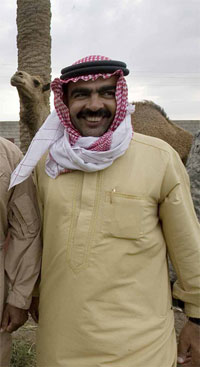Some news and stories from Iraq you may not have picked up from your daily news ...
- One hundred insurgents detained in Baghdad during past week, by Bill Murray. The Long War Journal:
BAGHDAD, IRAQ: Iraqi and Coalition forces in and around Baghdad captured more than 100 insurgents and defused 147 improved explosive devices during the past week as part of continued security operations, according to Iraqi and Coalition spokesmen. One insurgent was killed, six kidnap victims liberated and about 700 kilograms of TNT discovered during security sweeps in the past seven days, said Iraqi Army spokesman Major General Qassim Atta during a press conference in Baghdad today.
The current security plan, called Fardh al-Qanoon, or `Enforcing the Law,’ has been in place since early 2007, when U.S. planners began implementing a U.S. troop surge and divided Baghdad into separate security districts. Iraq forces now lead operations in all three of Iraq’s major cities, Baghdad, Basrah and Mosul and are operating in Amarah, where the Iraqi Army is currently battle elements of the Mahdi Army, said U.S. Rear Admiral Patrick Driscoll at the same press conference.
"So far in Amarah, there has been little resistance to the extension of the rule of law," Driscoll said. "There are still foreign terrorists who want to reconstitute their forces. Elements of Al-Qaeda and Iranian-supported Special Groups are still in Baghdad, but they are under pressure" ...
- Ramadi Citizens Continue to Sign Up to Defend Their City, by Lance Cpl. Casey Jones. Iraq's Inconvenient Truth June 22, 2008:
Over the last two years, Ramadi has seen a dramatic in the number of policemen as the city progressively moves toward the final steps in becoming fully independent.
In 2006, there were very few police in Ramadi when violence engulfed the city, the citizens lived in fear, and al-Qaida had a firm grip on the region.
In the first two weeks of 2007, the city experienced an unexpected surge of applicants seeking to join the force. During that two-week span, more than 1,000 applicants sought law enforcement jobs in Ramadi, according to Army Maj. Thomas Shoffner, operations officer for the 1st Brigade, 1st Armored Division. The turning point for the boost in applicants was the murder of a well-known sheik in August 2006. The murderers hid his body for 3 days denying his family the right to bury him in accordance with Islamic tradition. After the killing, tribal leaders could not tolerate al Qaeda’s lawlessness and violence throughout their land and formed an alliance against the terrorist network called, Sahawa al-Anbar, or the “Awakening Council.”
- Marines Turn Over Outpost to Iraqi Army May 31, 2008:
It’s a trend seen more and more frequently around al-Anbar province; Marines packing up their gear and returning their positions to the Iraqi Security Forces (ISF) so they can continue providing protection and security to the Iraqi citizens....
- Improved Iraqi Forces Contribute to Four-Year Violence Low May 30, 2008:
BAGHDAD — Last week, Iraq experienced the lowest level of “security incidents” since March 2004, a reduction that military officials attribute in part to improvements in Iraqi security forces.
“The collective efforts … to increase the capacity of the Iraqi security forces is a key part of the reason why we saw last week the lowest level of security incidents in Iraq the past four years,” Army Maj. Gen. Kevin Bergner, a Multinational Force Iraq spokesman, said May 28 during a news conference in Baghdad.
“It is also why we are seeing Iraqi citizens increasingly supporting their security forces by calling in tips on criminal activity and illegal weapons,” Bergner continued. “And it is why we are seeing the Iraqi security forces conducting effective operations in Basra, Mosul and Baghdad to enforce the rule of law.”
- Democracy Takes Root in Arab Jabour , by y Sgt. David Turner. May 18, 2008 (Multi National Force Iraq):
FORWARD OPERATING BASE KALSU — “Democracy is a new thing in Iraq,” said Sadi Kalif, the newly elected chairman of the South Rasheed Community Council. “When Saddam was in power, there were no elections. They just pointed to a person and said ‘You are in charge’.”
After years of war and terrorist activity from insurgents and al-Qaeda in Iraq, the citizens of this area south of Baghdad are learning to trust the path of democracy. They are also discovering the process begins not at the top, but in their own neighborhoods.
Members of the South Rasheed Community Council met in Bejiya May 14, where they elected their new chairman and met with Coalition and Iraqi forces. Soldiers of the 1st Battalion, 30th Infantry Regiment, 2nd Brigade Combat Team, 3rd Infantry Division, responsible for the area for the past year, introduced the council to the incoming Iraqi Army commander.
Leaders on all sides acknowledged that progress in the area is only possible while strong security forces are in place.
“Al-Qaeda occupied this area for three years,” Kalif said. “It was like the Dark Ages … We had two previous elections, but nobody showed up because of al-Qaeda. If someone participated in the elections, they might get killed.”







